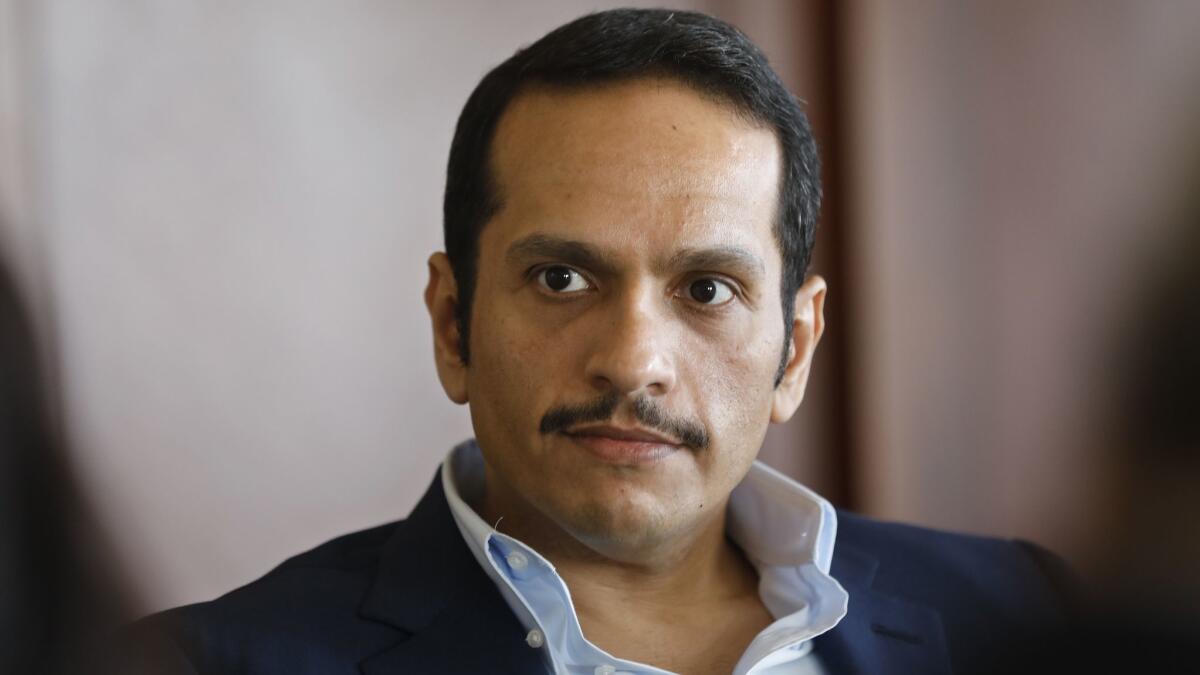Despite blockade by Persian Gulf nations, tiny Qatar shows it knows how to survive

In June 2017, things were looking grim for the Persian Gulf nation of Qatar.
A Saudi-led coalition of Arab states had just severed diplomatic and economic ties, imposing a blockade that sent people rushing to the grocery stores to stockpile food.
Even the United States, a longtime ally, appeared to have abandoned Qatar when President Trump accused it of supporting terrorism.
The oil-rich nation of 2.6 million people braced for the worst as experts warned of a looming humanitarian crisis.
But the worst never came. Instead, the economy is growing. This month the International Monetary Fund reported that Qatar’s gross domestic product is on target to grow 2.4% this year, up from 1.6% in 2017.
Increased oil prices played a big role, but so did an intensive lobbying effort, a search for new economic opportunities and political maneuvering in the international fallout from the October killing of Saudi journalist Jamal Khashoggi.
“Qatar remains open to business,” said Kristian Coates Ulrichsen, a Middle East analyst at Rice University’s Baker Institute. “The blockade has been a failure by that outcome.”
Saudi Arabia had been trying to punish Qatar for allying itself with Iran — the Saudis’ chief rival — and trying to exert its independence and influence foreign policy.
Soon after Trump became president, Saudi Arabia began playing up Qatar’s support for Islamist political groups, including the Muslim Brotherhood in Egypt and the Ennahda party in Tunisia, to suggest that it was harboring and supporting terrorists.
“They wanted to shape the thinking of the U.S. administration and create a perception that Qatar was supporting terrorism,” Ulrichsen said.
On June 5, 2017, Saudi Arabia and its allies, the United Arab Emirates, Bahrain and Egypt, announced the blockade, which they said would not be lifted until Qatar met 13 demands, including shutting down the Doha-based news media site Al Jazeera, scaling back relations with Iran, shutting down the Turkish military base being built in Qatar and severing ties to the Muslim Brotherhood.
Saudi Arabia shut its land borders with Qatar, and the other three countries imposed a land, sea and air embargo.
Qatar, which denies that it supports terrorism, is home to the largest U.S. military base in the region. Still, Trump sided with Saudi Arabia and called Qatar a “funder of terrorism at a very high level” — even as then-Secretary of State Rex Tillerson tried to end the blockade for humanitarian and military reasons.
Qatar was no stranger to such a blockade. In 2014, Saudi Arabia, the United Arab Emirates and Bahrain withdrew their ambassadors from Qatar for eight months over its alleged support of Islamist groups. The rift caught Qatar by surprise and tainted its international reputation.
Not wanting to be caught off guard again, Qatari officials soon began making contingency plans, according to Ulrichsen.
They were ready this time. Within two weeks of the new blockade, Qatar had figured out new trade routes through Oman and India. By last fall, Qatar had already opened a new seaport for importing food and other essential supplies.
At the same time, it also has begun to establish itself as an international mediator — it recently hosted talks between the U.S. government and the Taliban — and offer incentives for foreign companies to expand into Qatar.
“We have seen record numbers of foreign and domestic company registrations,” Sheik Mohammed bin Abdulrahman al Thani, the country’s foreign minister, told The Times.
Trade with Iran and Turkey also increased, according to Shibley Telhami, a government and politics professor at the University of Maryland.
“Qataris like to say that they learned how to be more independent,” Telhami said.
Improving relations with Trump required more stamina. Qatar has spent millions of dollars on a public relations charm offensive, arranging for influential U.S. academics and policymakers to visit Doha, the capital, and meet government and other officials.
“It took time and resources to replace the blockading states’ lies with the truth, including inviting delegations to visit Qatar and investigate the blockade for themselves,” Al Thani said. “Our guests learned that Qatar has been and is a steadfast ally of the United States, committed to combating terrorism and defeating extremism in the region and around the world.”
The U.S. administration soon began urging Saudi Arabia to resolve the crisis, and in April Trump invited Qatar’s emir, Sheik Tamim bin Hamad al Thani, to the White House, calling him a “a valued partner and longtime friend.”
The killing of Khashoggi, a dissident who disappeared after entering the Saudi Consulate in Istanbul, Turkey, also gave Qatar some international leverage in its fight with Saudi Arabia. The CIA has concluded that Saudi Crown Prince Mohammed bin Salman ordered the killing, and the international outcry has weakened his standing.
Qatar has joined an international chorus calling for the killers to be held accountable.
Trump dismissed the CIA conclusion and reaffirmed the U.S. relationship with Saudi Arabia, but analysts said he now has the power to persuade Saudi Arabia to relax the blockade if he wants to.
“Now Saudi Arabia owes him,” Telhami said. “Whether Qatar is a priority for Trump, though, is another story altogether.”
Follow me on Twitter @melissaetehad
More to Read
Sign up for Essential California
The most important California stories and recommendations in your inbox every morning.
You may occasionally receive promotional content from the Los Angeles Times.











